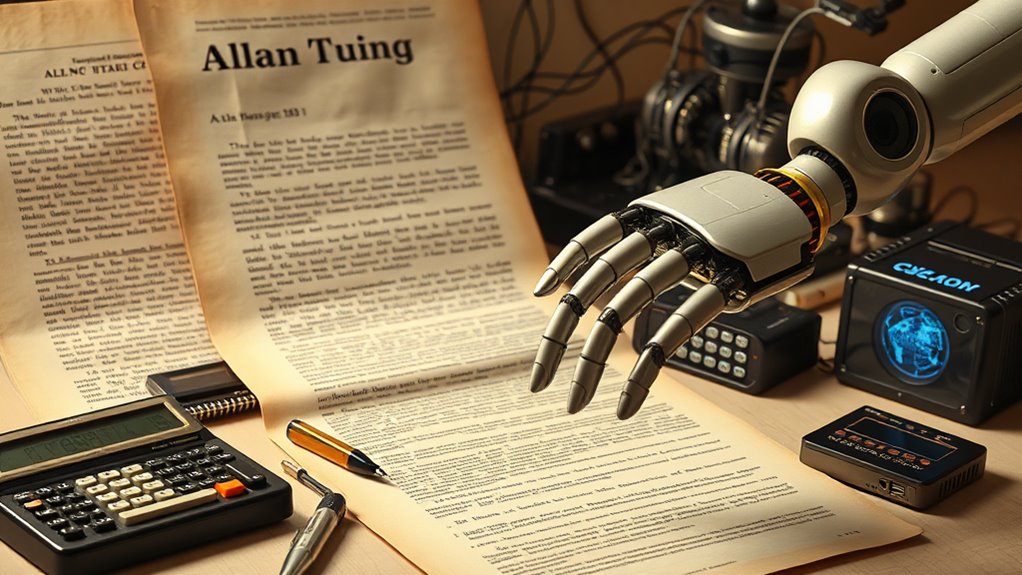Artificial intelligence (AI) refers to machines simulating human intelligence to perform tasks. It encompasses various technologies like machine learning, which helps systems learn from data, and natural language processing, allowing machines to understand human language. You’ll encounter types of AI, including narrow AI that handles specific tasks and general AI with broader adaptability. Many industries utilize AI for applications like healthcare innovations and smart assistants. As AI continues to evolve, it promises to reshape our lives, but it also raises ethical considerations. Discover more about its types, workings, and future to grasp its growing impact.
Key Takeaways
- Artificial Intelligence (AI) simulates human intelligence processes, enabling machines to perform tasks that typically require human cognition and decision-making.
- AI encompasses various types including Narrow AI for specific tasks, General AI for human-like adaptability, and Superintelligent AI that could exceed human intelligence.
- Key components of AI include machine learning, neural networks, and natural language processing, which allow systems to learn, process data, and understand human language.
- AI has wide-ranging applications, such as improving healthcare, enabling autonomous vehicles, enhancing smart assistants, and personalizing marketing strategies.
- The future of AI presents both opportunities for advancement in daily life and ethical challenges around job displacement and equitable access to technology.
Definition of Artificial Intelligence
Artificial Intelligence (AI) refers to the simulation of human intelligence processes by machines, primarily computer systems. You might encounter intelligent machines that can perform tasks requiring human-like understanding. At the heart of AI, you’ll find machine learning, a subset that allows systems to learn from data and improve their performance over time without being explicitly programmed.
Natural language processing (NLP) is another key aspect of AI, enabling machines to interpret and respond to human language. This technology helps bridge the gap between human communication and machine understanding. As you explore AI, you’ll also come across neural networks, which are designed to mimic the way the human brain processes information. These networks allow machines to recognize patterns and make decisions based on complex data sets.
Cognitive computing builds on these concepts by creating systems that can reason and learn like humans. By grasping the definition and components of AI, you’ll better appreciate its potential and impact on your daily life. AI isn’t just a futuristic idea; it’s already shaping industries and driving innovation right now.
Types of Artificial Intelligence
When it comes to the types of artificial intelligence, you’ll typically encounter three main categories: narrow AI, general AI, and superintelligent AI.
Narrow AI refers to systems designed to perform a specific task, like facial recognition or language translation. These machines are often seen in our daily lives, functioning as reactive machines. They don’t learn or adapt beyond their programmed capabilities.
General AI, on the other hand, involves a level of intelligence that can understand, learn, and apply knowledge across various domains, much like a human being. This type of AI remains largely theoretical but holds the promise of enhancing numerous fields.
Lastly, superintelligent AI surpasses human intelligence and capabilities, making it a potential game changer for society, though it raises ethical concerns about control and safety.
Here’s a quick rundown of the types:
- Narrow AI: Task-specific, reactive machines
- General AI: Human-like adaptability and learning
- Superintelligent AI: Exceeds human intelligence
- Limited Memory: Learns from historical data for better decision-making
Understanding these types helps you appreciate the vast potential of AI technology.
How Artificial Intelligence Works
Leveraging vast amounts of data, artificial intelligence systems operate by mimicking human cognitive functions through algorithms and machine learning models. You’ll find that machine learning acts as a backbone for AI, allowing systems to learn from data and improve their performance over time.
At the heart of many AI applications are neural networks, which are designed to recognize patterns and make decisions. These networks consist of layers of interconnected nodes that process data, much like the human brain. The more data you feed into these networks, the better they get at finding intricate relationships.
Natural language processing is another essential area where AI shines. It enables machines to understand and respond to human language effectively, enhancing communication between you and technology.
Data processing plays a significant role, ensuring that the information fed into the AI system is clean, structured, and ready for analysis. To achieve ideal performance, algorithm optimization is necessary, as it refines the models for accuracy and efficiency. By understanding these processes, you gain insights into how AI can simulate human-like thinking and decision-making in various contexts.
Applications of Artificial Intelligence
From healthcare to finance, the applications of artificial intelligence are transforming industries and enhancing everyday experiences. You might not realize it, but AI’s impact is all around you. Whether through smarter services or revolutionary technologies, AI is reshaping how we live and work.
Here are some key applications of AI you should know about:
- Healthcare innovations: AI helps in early disease detection and personalized treatment plans.
- Autonomous vehicles: Self-driving cars use AI to navigate, reducing accidents and improving traffic efficiency.
- Smart assistants: Personal assistants like Siri and Alexa make daily tasks easier by responding to voice commands and automating routines.
- Predictive analytics: Businesses leverage AI to analyze data patterns, enabling more accurate forecasts and strategic decisions.
These applications illustrate the sheer potential of AI. You can see how it personalizes marketing strategies, making ads more relevant to you based on your interests. As AI continues to evolve, expect even more exciting developments that will change the way you live your life. Remember, embracing AI means embracing the future!
Applications of AI
AI is used across various industries to improve efficiency and innovation. Some key applications include:
- Healthcare: AI assists in diagnosing diseases and personalizing treatment plans.
- Finance: AI detects fraudulent transactions and automates trading.
- Retail: AI enhances customer experiences through personalized recommendations.
- Transportation: AI powers self-driving cars and optimizes logistics.
Benefits of AI
AI offers numerous advantages, such as:
- Increased Efficiency: Automating repetitive tasks saves time and resources.
- Improved Accuracy: AI reduces human error in data analysis and decision-making.
- Enhanced Innovation: AI drives advancements in fields like medicine and robotics.
Challenges and Ethical Considerations
While AI has immense potential, it also raises concerns:
- Bias: AI systems can inherit biases from the data they are trained on.
- Privacy: The use of personal data in AI systems can lead to privacy issues.
- Job Displacement: Automation may replace certain jobs, impacting the workforce.
Addressing these challenges requires responsible AI development and regulation.
Future of Artificial Intelligence
The future of artificial intelligence holds incredible promise, with advancements set to revolutionize nearly every aspect of our daily lives. Everyday tasks will become easier as AI integrates into our homes and workplaces, enhancing efficiency and innovation. However, this evolution brings ethical considerations that can’t be overlooked. As AI systems become more capable, the potential for job displacement increases. Many industries may need to reevaluate workforce structures, leading to shifts in employment opportunities.
You might wonder about the societal impact of these changes. Future predictions suggest that while automation could lead to increased productivity, it may also widen economic disparities and challenge existing social norms. Ensuring equitable access to AI technologies becomes essential in mitigating these risks.
As we embrace technological advancements, balancing progress with responsibility will be significant. Policymakers, businesses, and individuals will need to navigate the complexities of AI implementation carefully. By addressing ethical considerations head-on, we can shape a future where AI benefits everyone. In this rapidly evolving landscape, your awareness and proactive engagement with these issues will play a considerable role in determining the trajectory of artificial intelligence.
Frequently Asked Questions
What Are the Ethical Implications of Using Artificial Intelligence?
Ever wondered how your decisions might be affected? Ethical considerations like privacy concerns, accountability issues, and decision-making transparency greatly influence society. Understanding these factors is essential to grasping AI’s potential impact on our lives.
Can Artificial Intelligence Replace Human Jobs Entirely?
No, artificial intelligence can’t replace all human jobs entirely. Instead, it drives job automation and economic impact, prompting workforce evolution and skill shifts. Future predictions suggest new roles will emerge, creating opportunities amid changes.
How Do Bias and Fairness Affect Artificial Intelligence Systems?
Bias impacts AI systems considerably. You need to take into account fairness metrics and data representation to guarantee algorithmic accountability. Focusing on equity considerations helps create more equitable outcomes, ultimately leading to improved trust in AI technologies.
What Is the Role of Machine Learning in Artificial Intelligence?
Imagine teaching a child: that’s machine learning in AI. Supervised learning trains with labeled data, unsupervised learning uncovers patterns, reinforcement learning learns through feedback, while neural networks and deep learning create powerful decision-making systems.
How Can I Start Learning About Artificial Intelligence?
To start learning about AI, enroll in online courses, read AI books, engage in practical projects, participate in community forums, and attend AI workshops. These resources will enhance your understanding and skills effectively.
Conclusion
In the world of technology, artificial intelligence (AI) is becoming a part of our everyday lives. It might sound like something from the future, but it’s already here, making things easier and better for us. By using AI, you can discover new possibilities and simplify tasks. As you move through this changing world, keep in mind that AI isn’t just about machines—it’s about helping people be more creative and efficient. The future is calling, and it’s time to move forward together.





